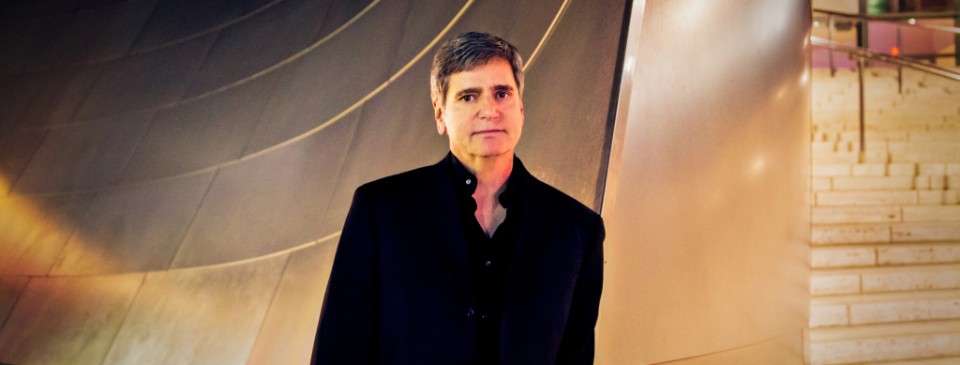Matador Composer Takes on Vampires — and Other Legends

It’s always a good idea to have options coming out of school. A journalism degree can be used in a variety of fields, such as public relations or marketing. A biology degree can be parlayed into research or medicine. For former CSUN music major and professional film composer Patrick Morganelli, his career path after graduating from California State University, Northridge took a different trajectory — one where he felt as comfortable in the cockpit of an F-14 Tomcat jet as he did behind a piano.
Before he set music to films and stage performances or flew planes for the Navy, however, he began his education at CSUN — among the top 25 music schools in the nation, according to The Hollywood Reporter.
“The music department was a real powerhouse, and we had many distinguished professors and visiting artists,” Morganelli said. “There were many professors at CSUN that had a tremendous impact on my education, probably too many to list, but a few do come to mind: There’s Charles Fierro, with whom I studied piano; Daniel Kessner, my first theory and composition teacher, with whom I’m proud to say that I’m friends to this day; and George Skapsky, the most demanding professor I ever had the honor to study with, who made us understand that excellence takes work.”
Along with the long list of excellent professors, musical legends such as Aaron Copland, Andres Segovia and Aram Khachaturian visited his classrooms, Morganelli said. Armed with that education, he graduated and hit the circuit, working as a musician and accompanist. However, another passion that he had since childhood kept buzzing around in his head at the same time his career was taking off — his love of airplanes. It would be a passion he would soothe by joining the U.S. Navy.
“I was glad to get the music work and it was going well but I’d always loved airplanes and thought I’d try that as well,” Morganelli said. “The Navy wasn’t much interested in a guy with a degree in music, but I wore them down and they finally agreed to give me a chance. I ended up having a long, successful career as a Naval officer, flying the F-14 Tomcat jet fighter — like the ones in Top Gun — from aircraft carriers.” If anything, the time in the Navy taught Morganelli perspective about his musical career, something he’s taken to heart to propel his work further.
“People in music often feel that situations are life-and-death matters, but they almost never actually are,” he said. “In flying military jets, however, every single time you climb into a jet you’re inserting yourself into a situation that very possibly could devolve into fiery, catastrophic death in the blink of an eye. This isn’t hyperbole. In the years I spent flying in the Navy, I personally knew 30 to 40 guys who were killed in jets, and perhaps half of them were good friends. So one advantage I have in my music career over some other composers is that no matter how dire a situation looks, I know that it isn’t likely to result in death and burning wreckage, and it helps immeasurably in remaining calm when others are freaking out.”
One might think that the road back to film composition after that experience flying fighter jets would be a hard one, but Morganelli spent some of his spare time in Washington, D.C., while working at the Pentagon. He got to know musicians from the National Opera and played with them. They encouraged him to return to music, and before he knew it, Morganelli was working on his first film score.
Soon, he was accepted into the USC Thornton School of Music, where he studied piano with Daniel Pollack and received a master’s degree and a postgraduate certificate in Scoring for Motion Pictures and Television.
Since then, he’s been working on film projects and a wide array of arrangements such as Hercules vs. Vampires. It was originally commissioned by a small opera company in Portland, Ore., before it made its way to the LA Opera stage. The production is currently in negotiations to be shown domestically and internationally. Morganelli also has been invited to write a violin concerto during his upcoming time as Artist-in-Residence in Yosemite National Park. And, of course, he has high hopes for scoring some upcoming films.
“It’s a mistake to think the art of scoring a feature film is a joyful experience that leaves everyone glowing with fulfillment,” he said. “But when everything works well, it does bring a level of satisfaction that’s hard to explain.”
For Matadors hoping to break into the field of film composition, Moganelli offered a few tips:
• “Make sure you’re strong on the technical end of modern computer music technology, with an emphasis on Apple products and the various Digital Audio Workstation programs.”
• “Make sure you have a good plan for a day job, as it can take a very long time to start making decent money in the field. As day jobs go, the best is to work for an established composer, as an assistant.”
• “Since it’s all about who you know, a job where you meet people and get to know them can also be valuable, such as being a bartender where a lot of movie and TV people hang out. I know a composer who started that way, and now he has a beautiful home, a ranch in Montana and a car that’s a lot better than mine.”

 experience
experience